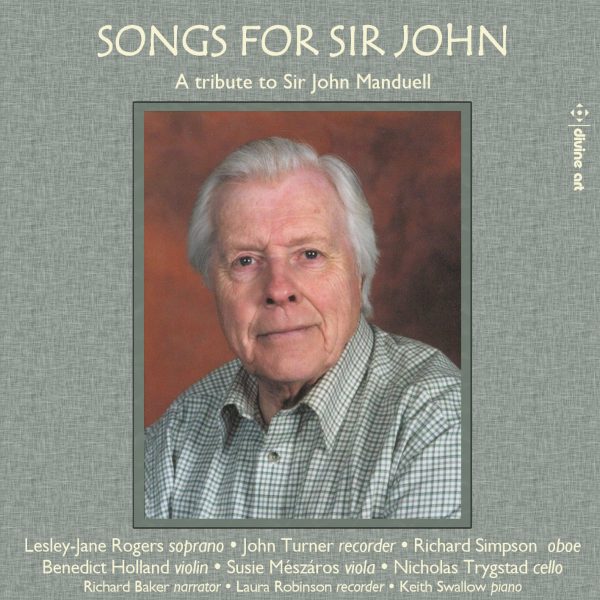Infodad
The winds heard on a new Divine Art recording of music by no fewer than 16 composers are used in the service of a particular concept: a tribute in chamber music to Sir John Manduell (1928-2017), a well-known producer, teacher, and artistic director in Great Britain, and a composer as well. Manduell is virtually unknown in the United States in any of his roles, in all of which he functioned in the United Kingdom, and while he is famed within the music profession in Europe, he is not exactly a household name outside the music field, even there. So the CD called Songs for Sir John, although certainly well-meaning and assembled in exemplary fashion, reaches out to a very limited audience indeed.
The composers themselves are scarcely household names: Robin Stevens (born 1958), Elis Pehkonen (born 1942), Martin Bussey (born 1958), Geoffrey Poole (born 1949), Sally Beamish (born 1956), Michael Ball (born 1946), David Home (born 1970), David Matthews (born 1943), Kevin Malone (born 1958), Gary Carpenter (born 1951), Peter Dickinson (born 1934), Lennox Berkeley (1903-1989), Robin Walker (born 1953), Jeremy Pike (born 1955), Nicholas Marshall (born 1942), and Naji Hakim (born 1955). To the extent that the disc has a theme – and a level of interest beyond that of tribute – it lies in the use by many of the composers of the poetry of William Butler Yeats (1865-1939),whose works were chosen because Yeats was Manduell’s favorite poet.
The various Yeats settings use instruments in different ways and different combinations: Stevens and Pehkonen, for example, combine soprano with recorder, oboe, violin and cello; Bussey omits the oboe; Beamish contributes an instrumental Yeats Interlude for recorder, oboe, violin and cello; Dickinson turns to a contemporary of Yeats, James Joyce, for a work for soprano, recorder, violin and cello; Berkeley, who of course was not alive at Manduell’s death, is represented by Three Duets for Two Recorders, which are attractive and very short pieces; Walker sets Four Nursery Rhymes, which are certainly not by Yeats, for narrator, recorder and piano.
The comparatively limited instrumental complement is employed skillfully by all the composers, and both the singing and the playing are very fine, although the works that stand out most clearly are the ones not using Yeats’ poetry – simply because they offer verbal coloration of a different kind. The composers’ writing for winds as well as strings is quite good throughout the disc, and even though this is scarcely a CD that will have wide appeal, it is one that offers a considerable number of well-thought-through settings that provide listeners who have a taste for modern British chamber music with the chance to hear quite a few interesting examples of it.
@divineartrecordingsgroup
A First Inversion Company
Registered Office:
176-178 Pontefract Road, Cudworth, Barnsley S72 8BE
+44 1226 596703
Fort Worth, TX 76110
+1.682.233.4978












